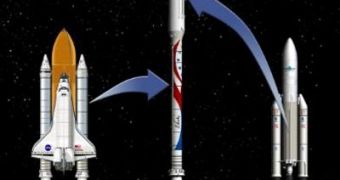Representatives from the American space agency signed an important document recently, certifying the support that NASA is about to bestow on the Alliant Techsystems' (ATK) commercial Liberty Launch System (LLS). The agreement does not include monetary support from the agency.
The agreement also goes a long way towards furthering international partnerships between NASA and other research groups, organizations and space agencies around the world. This goal was stated by the 2010 National Space Policy proposed by US President Barack Obama.
NASA and ATK are now officially partners on the development of the new Liberty rocket, a project that includes European partners and seeks to provide an alternative to existing systems developed by companies such as Orbital Sciences Corporation and Space Exploration Technologies Corporation.
ATK has extensive experience with rocket motor design, manufacturing and testing, having been a major contractor on the NASA Space Shuttle Program for decades. Tens of the thrusters, the shuttles and their twin Solid Rocket Boosters (SRB) used were produced by the company.
Now, the firm plans to move into the new market niche, which is constructing vehicles for NASA so that the space agency can orient its efforts towards conquering near-Earth asteroids by 2025 and Mars by the mid-2030s. These goals are also stated in the 2010 NSP.
The new Space Agreement Act “enables us to exchange information with NASA and receive valuable insight as we develop our fixed-price commercial crew vehicle and prepare it for test flight as early as 2014,” Kent Rominger explains.
“This helps us to ensure that we provide the safest, most reliable, cost-effective and capable launch vehicle for crew transport,” adds the official, who is the vice president and program manager for Liberty at ATK.
The rocket will be made up of a five-core first stage provided by ATK. The motors on this stage are certified for human spaceflight, which makes them extremely reliable. The company's main European partner, Astrium, will provide the entire core stage from its Ariane 5 rocket.
With the help of the latter's Vulcain 2 engines, Liberty's upper stage will be able to lift as much as 44,000 pounds of cargo to low-Earth orbit (LEO), the equivalent of nearly 20 tons of material, SpaceRef reports.
“With this SAA we believe NASA will benefit from gaining insight into the various systems we are developing, and we can benefit from the feedback. In the end we hope to offer a commercial solution to NASA, the Department of Defense and other commercial human spaceflight programs,” Rominger says.

 14 DAY TRIAL //
14 DAY TRIAL //